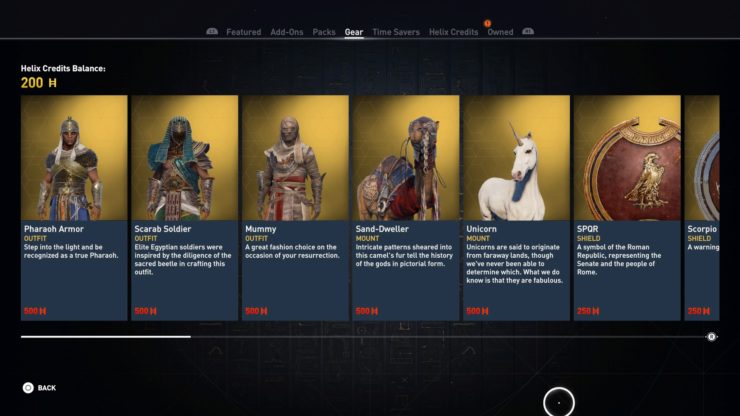Assassin’s Creed Origins released today, giving the series a soft reboot and taking players into Ancient Egypt where it all started. Surprisingly, there has been little to no publicity on the fact that the game does contain clearly pay-to-win microtransactions.
Amidst the wave of games just released that contain controversial loot boxes, it’s rather strange that Assassin’s Creed didn’t make the cut while other triple-A titles such as Star Wars: Battlefront 2 and the similarly single-player Middle-earth: Shadow of War have been ridiculed left, right and centre on the matter.
This is perhaps because Assassin’s Creed Origins goes about it in a different, less intrusive way. While Battlefront 2 originally made it so that you could not progress your skills without partaking in loot boxes, and Shadow of War teased better loot boxes that could only be purchased with real-world money while you opened your pitiful, lower-tier box, Assassin’s Creed Origins keeps its store completely out of the way in a separate menu.

Screenshot courtesy of WCCFTech.
That’s not to say that it doesn’t sell pay-to-win items, as the store is filled with skill points, location icons, in-game currency packs, outfits and legendary weapons, but it does its best to keep each item as far from the core game as possible. These exist merely to save time under the meta title of “time savers”, without aiming to impact on the game itself.
While this is a full-priced $60 and many of you will feel that implementing a solitary loot box alongside microtransactions into a title is unacceptable no matter of the circumstance, Assassin’s Creed Origins is a true single-player game, so these items literally affect no one other than yourself. As for concerns that Ubisoft will have changed the core gameplay elements into a grind-fest to entice the purchasing of items, the gameplay is actually rather balanced, with many praising the changes made from past titles in the series.
KitGuru Says: How low-key the news has been on microtransactions within the game reflects how subtle the genuinely are in the title. Now that it’s known that Assassin’s Creed Origins has a loot box and microtransactions, does that change your stance on getting the game?
 KitGuru KitGuru.net – Tech News | Hardware News | Hardware Reviews | IOS | Mobile | Gaming | Graphics Cards
KitGuru KitGuru.net – Tech News | Hardware News | Hardware Reviews | IOS | Mobile | Gaming | Graphics Cards



I didn’t think I’d see Ubisoft handling something unpopular in a better way than other companies. I thought they’d be one of the leaders in terms of poor handling.
It’s not really any better than the rest. Accepting MTs in $60 in any form is still a problem. They’ve literally only done this as a publicity stunt to look better so sites like yours will make them look good an they’ll get more sales, which means more chances for people to buy those lootboxes. I mean, did we really forget they are still hiding in game content in the game for sale only? Did we really forget that almost every earlier Assassin’s Creed had no such MTs, especially not lootboxes? This changes nothing… until they just stop these practices altogether.
And to think this is one of the better examples in 2017? That’s kind of scary. I honestly think there’s a huge opening for mid-priced, explicitly-microtransaction-free games even if the lower dev costs really show. Look at how big Splatoon got despite being on the unloved Wii U.
Well, it sucks that it is in a full-priced game. It is more the way it is implemented, i.e., being semi-hidden and not being essential to remove an annoying grind, that is better.
Being semi-hidden and not being essential to remove an annoying grind is indeed better than some games, i.e., the $60 games that have in your face stores that have items that are essential unless you want to grind for annyoingly long times.
EDIT: But I do agree that a $60 game not having a MT store would be much better still.
I’ve played the game for about 20 hours, I don’t feel any grind if there is at all, I’m always overleveld for main story quests because there’s alot of side quests and a ton of exploring to do.
That is my point. I am saying that unlike some games they have not put in a grind that you have to either put up with or pay to remove.